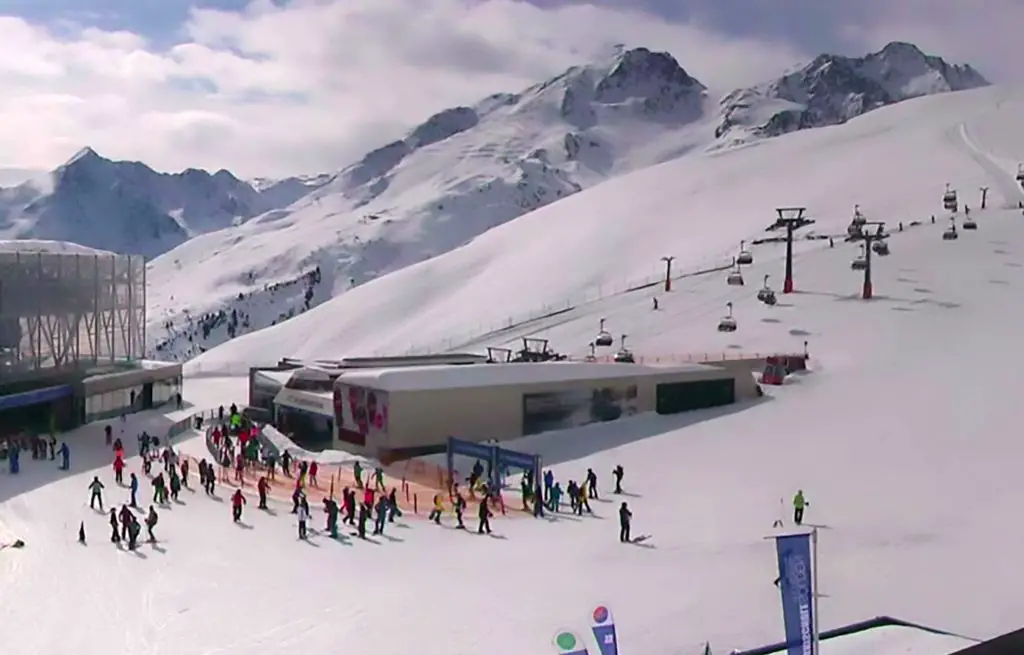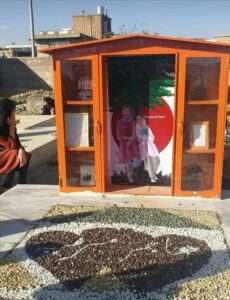Austrian prosecutors are refusing to investigate whether politicians in the region which houses the ‘Ibiza in The Alps’ resort covered up widespread coronavirus cases to save the ski season.
The alarm was raised by local opposition politician Dominik Oberhofer, who is in charge of the Neos party in the southern Austrian province of Tyrol which borders Italy.
In an interview with Newsflash he speculated that it was hushed up under pressure from the powerful hotel and cable car lobby in Ischgl where not only was the tourism season in full swing, but where there was also an important election.

He said: “I have experience dealing with them before. They act like they are a law unto themselves.”
Oberhofer said questions needed to be asked about the relationship between hoteliers and the ruling party that needed success in the local Chamber of Commerce (WKO) election to ensure party funding of around 2.5 million EUR (2.28 million GBP) annually continued.
After officials still declined to act despite opposition questions, a criminal complaint was organised by Austrian consumer protector Peter Kolba who runs an independent consumer rights association and filed by lawyer Alfred Noll.
Together with a local investigative journalist, Sebastian Reinfeldt, they put together a chronology detailing evidence that allegedly shows that there was a cover-up, but still prosecutors declined to act.
The complaint to prosecutors includes allegations of abuse of office, endangering the health of the community and failure to warn over a communicable disease against the governor of Tyrol, Guenther Platter, as well as to the heads of the Tyrolian Health Authorities Bernhard Tilg and Franz Katzgraber.
He also wants the powerful cable car companies, the Silvrettaseilbahn AG and the Skiliftgesellschaft Soelden, investigated, as well as the mayor of Ischgl, Werner Kurz and the Kitzloch bar owner, Theresa Schroer.
But Austrian prosecutors have failed to follow up the claim saying that there is no evidence – something the campaigning lawyer wants to change by encouraging people to get in touch on his homepage which is in English (https://www.umfrageonline.com/s/f1fb254) to force the prosecutors to act.
In the complaint, it states clearly that health officials in neighbouring Bavaria in Germany told the authorities in Tyrol on 30th January that a woman had been infected with the coronavirus. In the week previously she had spent a holiday in Tyrol.
The earliest British case however was from a family who spent a holiday there between 15th and 19th January.
Daren Bland, 50, of Maresfield, East Sussex, is understood to have infected his wife Sarah and children after returning from Ischgl in mid-January where he attended a party at Austria’s ‘Ibiza of the Alps’.
A video emerged of a party at the resort where a group of people were singing and dancing to Highway to Hell by AC/DC – showing how close they were together, increasing the chances of the virus spreading.
Mr Bland joined three friends there from 15th to 19th January, with the others travelling home – two to Denmark and one to Minnesota in the US – sick. Prosecutors are now investigating the destination for possible negligence due to hundreds of foreigners leaving with the illness.
Mr Bland told the British Daily Telegraph: “We visited the Kitzloch [bar] and it was rammed, with people singing and dancing on the tables. People were hot and sweaty from skiing and waiters were delivering shots to tables in their hundreds.
“You couldn’t have a better home for a virus. I was ill for 10 days. It was like wading through treacle. I couldn’t get up, I couldn’t work, it knocked me for six. I was breathless.”
Mr Bland said he passed it on to his family – with his youngest daughter off school for two weeks – before symptoms spread through his neighbourhood ahead of half term.
The complaint by consumer protector says that even on 5th March, more than a month later, Icelandic officials declared Austria a high risk area, alongside China, Italy, South Korea and Iran, but that Austrian officials had still not acted.
Austrian officials had accused their Icelandic counterparts of overreacting and opposition politician Oberhofer said that they had been assured by the governor that there was no way the infections could have come from Ischgl.
Franz Katzgraber, head of the Tyrolean Regional Health Service, also said at the time that “from a medical point of view, it is unlikely that infections have occurred in Tyrol.”
Oberhofer said: “They told us that there was an Italian woman on the plane and that she had infected the people in Iceland ended up with the virus. This was their line. But now we are not so sure.”
Again, on 6th March tourists from Bremerhaven in Germany returned again with confirmed cases of the coronavirus. The Germans told local media: “On the Apres Ski the dance floors were full, we all had sore throats and were coughing and sneezing. We thought it was just a cold.”
Asked if they had thought about the coronavirus they replied: “Absolutely not, and we didn’t really feel that ill. And Austria was supposedly not a risk area.”
On 7th March, a barkeeper from Ischgl was tested positive in the Kitzloch. But the partying, according to the complaint to prosecutors, carried on almost uninterrupted.
On 8th March, Tyrol officials were still saying there was no problem and nothing to worry about. By this time, cases had appeared in Norway and then the next day on 9th March in Finland which also added Tyrol to the high risk areas following the infections of holidaymakers. Sweden followed a short while later according to the complaint. In Tyrol there was still no reaction.
On 10th March, Ischgl was deemed a no-go area in Denmark, but still the skiing continued. Only on 11th March did they announced that they planned to act – but only by stopping skiing the following Saturday.
Austrian prosecutor spokesman Hansjoerg Mayr said they had received it but said they had not acted on any of the allegations because there was at the moment no evidence.
He added the investigation would only be started if there was concrete evidence of a crime.
Kolba said he had decided to file a complaint because Tyrol authorities were not acting on what was clear evidence that they should have closed hotels and shut down the slopes.
Dominik Oberhofer, who is seeking answers from the regional governor, Platter, noted that in the crucial time before the province was shut down, there were four infection incidents in Tyrol, the first of which involved a hotel in Innsbruck.
He said: “In this incident, the governor acted absolutely correctly. The hotel was closed. Nobody was allowed in or out. There were two people who were infected and everyone else was put under quarantine and tested. It took a few days for the hotel to be completely disinfected before it could be reopened.”
He also noted that the hotel had no connections with the governor, Guenther Platter from the Austrian People’s party OeVP.
He said however that that was not the case involving the VIP Austrian resort of Ischgl, where he said there were elements that seem to regard themselves as above the law, and which had close ties to the ruling conservative People’s Party.
He said that in the case of the bar, the infected 36-year-old barkeeper was sent home into quarantine, but the bar owner was allowed to reopen 4 to 5 hours later serving customers himself together with the same staff who would have been working with the German barman at the Kitzloch who had been infected.
He said the governor allowed it, and even made it clear in a statement sent out on 7th and 8th March that people had no reason to be nervous, and reassured them that they would not be affected.
He said that after that there was a third incident involving a doctors’ congress in Arlberg which the opposition leader raised no issues over, but after that yet another questionable incident took place involving another hotel in the Zillertal owned by a Conservative MP who is extremely well connected with the local government, and again he said in this instance the same standards were not applied as to the Innsbruck hotel.
Elections for the local Chamber of Commerce in Tyrol took place on 4th-5th March where support of the local business community which predominantly revolves around tourism was vital for any party to have success.
Dominik Oberhofer said: “There are 2,400 hotel owners in Tyrol, and they make a major contribution to the campaign fund during an election like this. If they had all been forced to close down they would certainly not have been happy with the local party.”
Currently Austria has 6,001 patients, who were tested positive with COVID-19, with over 1,000 cases in Tyrol.
The ViralTab page is created by and dedicated to professional, independent freelance journalists. It is a place for us to showcase our work. When our news is sold to our media partners, we will include the link here.



